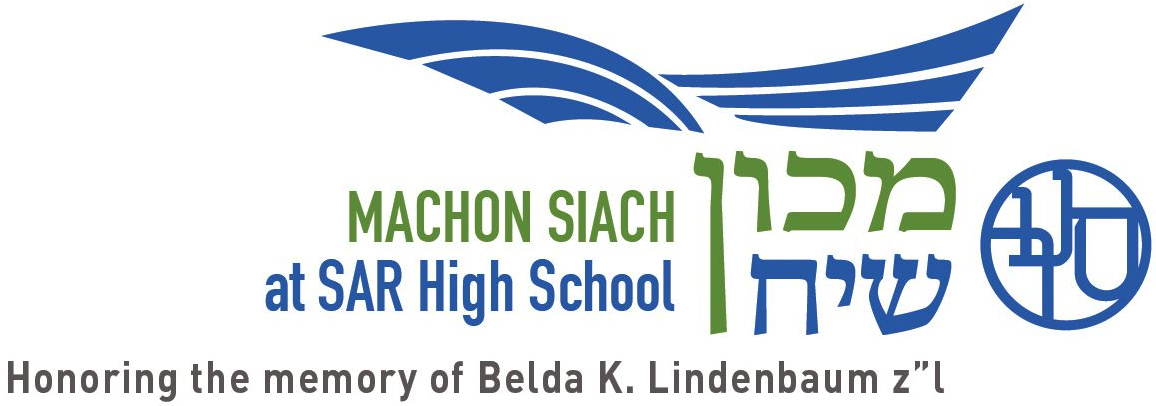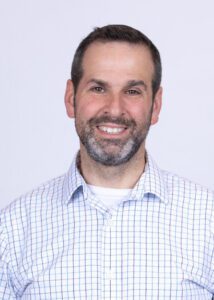
Coming Home to SAR
The question most frequently asked of me since I’ve returned to SAR is, “So what’s the biggest difference since you left 6 years ago?” Much is the same: Gruenbaum’s breakfast specials, shabbat ruach, superstar teachers and #StingNation, to name a few. Much is different, though. In the 2012-13 school year there were 498 students enrolled in SAR High School; in the 2019-20 school year we have close to 600 students. As the student body has grown so has our building. Embracing a larger student body in a larger facility and making sure that we maintain the warmth and the connectedness of a smaller school is an exciting opportunity and one that I am personally very invested in.
One of the most significant changes I’ve noticed at SAR High School is the extra Torah learning opportunities. It’s not just that these opportunities are available to students, it’s that students are participating in astonishingly impressive numbers. More than 300 students participated in the pre-Rosh Hashana Mishmar Madness. On Mondays and Tuesdays 200+ students participate in the Itim after school learning program and the Bekiut Chaburot. There are also chaburot by teachers during breakfast and lunch. Alumni learn with students on Fridays. There are a number of students who go to the Beit Midrash to learn during free periods. Six years ago we worked really hard just to gather up a critical mass for Itim and could not have imagined all the additional Torah learning taking place, with students eagerly and enthusiastically participating.
When I reflect on my current experience at SAR High School, I think of the chasidic story of Isaac Ben Yekel as told by Elie Wiesel in his incredible “Souls on Fire”:
Eizik, poor Eizik, what was he to do? What was there to do except worry? He prayed. Day after day, at every service and even between services, in the synagogue and in the street and at home, he begged the Lord to remember His debt-ridden and tormented servant who could go on no longer. To no avail. God seemed not to listen. Nevertheless, our Eizik continued to send Him his requests; it made him neither less pious nor less poor.
And then, one night, he had a strange dream: he saw himself swept away into a distant kingdom, inside its capital, under a bridge, in the shadow of an immense palace. And a voice told him: “This is Prague, this is the Vltava and over there, the palace of the kings. Now look and look well, for under this bridge, at the spot where you are standing, there is a treasure; it is waiting for you, it is yours. Your problems are resolved.”
In the morning Eizik mocked himself: dreams are very pleasant, they don’t cost anything, but they don’t serve any purpose either. He dismissed the entire matter from his thoughts. But that night, as soon as he closed his eyes, the same vision took hold of his mind: the capital, the palace, the bridge. And the same voice asking: “Do you want to be rich, or would you rather keep your worries?” What nonsense, Eizik thought. Go to Prague? What an idea! He had no desire to go there; he didn’t know anyone there. And furthermore, it was far. And expensive. And he had no money. If he did, he would know what to do with it. The rent, the butcher, the tutor. Well, between dreams and prayers, Eizik would choose the prayers; in fact, there’s even one to exorcise dreams. Of course, the tale does not end there. Next evening, for the third time, Eizik heard the voice: “What? You haven’t left yet?”
Annoyed more than intrigued, he decided to put an end to all this foolishness; he decided to obey. Or at least go through the motions. And so he started the journey, on foot. A few weeks later he arrived in Prague, famished and exhausted. He recognized the river, the bridge, the palace; it was starting all over: he was dreaming again! But no, it was not a dream. This really is strange, he thought. There was a certain spot under the bridge that looked oddly familiar. What if I tried? What do I have to lose? I should dig a hole, take a look. But careful, not so fast. The bridge is guarded, the soldiers must not become suspicious. Eizik prowled the area indecisively, trying to summon his courage, until he was noticed and arrested.
The captain of the guards accused him of spying. Too frightened to invent a story, he told the truth. The dreams, the worries, the long walk begun in Cracow, the memory and the voice of that memory. He was convinced, Eizik, that the officer would call him a liar and order him shot. And so, he thought he was dreaming again when the dangerous captain burst out laughing. He laughed so hard that tears ran down his cheeks: “No, is that really why you came from so far away? You Jews are even more stupid than I thought! Now look at me, such as you see me here, if I were as stupid as you, if I too listened to voices, do you know where I would be at this very minute? In Cracow! Yes, you heard me correctly. Imagine that for weeks and weeks, there was that voice at night telling me: ‘There is a treasure waiting for you at the house of a Cracow Jew named Eizik, son of Yekel! Yes, under the stove!’ Naturally, half the Jews there are called Eizik and the other half Yekel! And they all have stoves! Can you see me going from house to house, tearing down all the stoves, searching for a nonexistent treasure?”
Of course Eizik was not punished. Of course he hurried back home, moved the stove and, of course, he found the promised treasure. He paid his debts, married his daughters, and as a token of his gratitude, built a synagogue that bears his name: Eizik, son of Yekel, a poor and pious Jew who remained pious even when he was no longer poor.
There are multiple interpretations of this tale. One possibility is that we should realize that we do not need to travel far from home to seek our treasures since our treasures can really be found at home. We can also learn from this story that in order to fully understand and appreciate the treasures of your home, sometimes, you need to venture beyond the familiar. Perspectives gained by engaging the world outside of the confines of your home allow you to recognize and appreciate the richness and of your home in ways that would otherwise not be possible.
So as an insider who became an outsider, and has now returned like Isaac Ben Yekel, as an insider with an outsider’s perspective, I am deeply appreciative of the commitment to a mission that guides the school’s direction. And while some of the changes are gradual and perhaps imperceptible to an outsider, I recognize the incredible Torah learning as a fulfillment of SAR’s mission statement:
Shaping an environment of discourse and action where mitzvot inspire respect, obligation and aspiration.
The aspirational goal of increased Torah learning, and especially Torah learning done lishma, not for the sake of test grades, has shaped the school environment in ways that make me very proud to be a part of this extraordinary institution and excited about what the future has in store for us. I look forward to adding my voice to the chorus of SAR community members as we build upon our successes and create an environment that fosters increased Talmud Torah, the joy of Judaism, a deeper connection to Hashem and rigorous character development.



